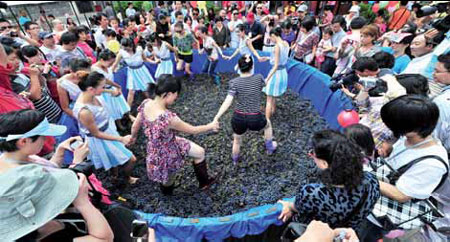Open-door policy
Updated: 2012-08-31 10:44
By Xiao Xiangyi and Li Yingqing (China Daily)
|
|||||||||||
|
Maidens dance on grapes at the Torch Festival for Yi ethnic group on Aug 11 at Yunnan Red Chateau. Provided to China Daily |
Focus on tourism attracts visitors to chateaus and increases production quality
On Aug 11 at Yunnan Red Chateau, several maidens were dancing on a huge barrel of grapes, surrounded by many curious and joyful tourists. It was part of the Torch Festival, a three-day holy celebration for the province's Yi ethnic group, and the carnival was made more magnificent by the celebration of this year's grape harvest.
Each year, Mile county in Southwest China's Yunnan province has an influx of tourists, mostly visitors to the county's cluster of chateaus. Chateau tourism, a budding business in this wine-producing region, makes it possible for customers to cultivate wine culture and observe production.
Most of these tourists are urbanites living in the surrounding cities. They usually drive to one of the county's chateaus on weekends and spend one or two days visiting the vineyards and cellars, or just tasting wine under the grape trellises.
There are more than 10 chateaus of varying sizes in the county. When the peak season comes, usually from June to August, it is hard to book accommodation or parking spaces in any of the chateaus.
Six years ago, the Yunnan Red Wine Company, the largest winery in the county, opened its chateau to visitors by providing accommodation and tours of the vineyard, workshop and cellar. It also has restaurants and a wine-themed museum.
"Yunnan Red's attempt is a milestone in the Chinese wine industry. It means wine producers are brave enough to face the monitoring of consumers," says Wu Kegang, the owner of Yunnan Red Chateau.
He says chateau tours are common in France, Italy and other Western wine-producing countries, but in China they were nearly unimaginable in the past.
According to Wu, his inspiration - or more exactly, determination - to develop chateau tourism came from a conversation with a French enologist 15 years ago.
The enologist, whom Wu only identifies as Nicolas, explained why Chinese red wine was excluded from the top tier of wine - the terrible sanitary conditions. At the time, Chinese wineries were reminiscent of traditional soy-sauce workshops, with flies and wastewater in abundance.
"You'll have a good and high-quality chateau once you can pick up a dropped piece of bread from the ground at any corner of your winery and eat it with no hesitation," Nicolas told Wu.
Wu was shocked. He was immediately determined to open up the entire spectrum of wine production at the Yunnan Red Chateau to consumers, for the "forced effect".
"Our management, greening and hygiene are all forced to be of a high standard," says Wu.
Each year, Yunnan Red Chateau plays host to nearly 80,000 tourists, but there is room for more - its maximum capacity is estimated to grow to 300,000 people per year in the next five years. Last year, Yunnan Red Wine Company recorded a total revenue of nearly 400 million ($62.9 million, 50.3 million euros), 5 percent of which came from tourism, according to Wu.
Li Yunfei, owner of Longyuan Chateau in the county, has also greatly benefited from opening its doors to visitors.
"Chateau tourism is a show window for our wine business. Most of the visitors will buy our wine after their experience," says Li.
Longyuan Chateau is a medium-sized winery in the county, with a limited production capacity. Nearly 30 percent of its total income in the past three years has come from tourism. Upon entering the chateau, one can still see grapes on the trellis although this year's harvest is almost over. "These grapes are left for tourists. They will feel disappointed if they come here without seeing any grapes," says Li.
In the chateau's vineyard, tourists can smell the unique fragrance of the ripe grapes. Li explains that they are called crystal grapes and are the best raw material for dry white.
Yunnan's crystal dry white wine is one of the region's signature products. In the 2006 Asian Wine Competition, crystal white wine from Yunnan Red won the first prize but judges dared not give them the award because the wine was inconceivably fragrant. "They suspected that spices had been added," says Wu.
Later, some of the experts from the competition visited Yunnan Red Chateau and were astonished that the region could produce wine of such a distinct flavor and fragrance.
"All the Chinese wines I had tasted were like counterfeits of Western wine. I have never tasted a real Oriental wine until this visit," says Robert Tinlot, honorary president of the International Organization of Vine and Wine.
But wine experts aren't the only ones who enjoy a visit to the chateaus - all sorts of wine aficionados might well discover something new.
"As a Yunnan local, I've drunk Yunnan Red for years, and I always wanted to see how it is produced. The wine-tasting steps of swirling, sniffing and sipping without swallowing in the lecture were interesting. I have never drunk wine like that," says Hu Shixi, a 71-year-old retiree visiting the Yunnan Red Chateau.
Today's Top News
Rescuers race against time for quake victims
Telecom workers restore links
Coal mine blast kills 18 in Jilin
Intl scholarship puts China on the map
More bird flu patients discharged
Gold loses sheen, but still a safe bet
US 'turns blind eye to human rights'
Telecom workers restore links
Hot Topics
Lunar probe , China growth forecasts, Emission rules get tougher, China seen through 'colored lens', International board,
Editor's Picks

|

|

|

|

|

|






